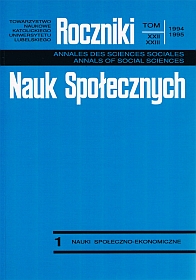„III koszyk” KBWE − na drodze do równości i praw w Europie
Abstrakt
Equality among people is treated as a value expressed in the normative language as the principle of the euqality of rights. However, when we interpret the principle of the equality of rights we often tend to indetify it with the principle of the equality towards rights. Thus we loose its broad dimension combining the equality towards rights with the equality of legal protection. The analyses of the phenomenon of discrimination have lost the discrimination due to the criterium of citizenship which is derivative of the legal protection of the basic human rights and basic freedoms in various countries. A "justification" for this differentiation was, among other things, inclusion of humna rights within the exclusive internal competence of the State, or consent to the existence of "divergent conceptions of human rights".
A particular example of the territorial breach of the equality of rights was Yaltan Europe. It was the third basket of the Final Act of CSCE that the process of forming a uniform European standard of human rights was initiated. Combining two problems: hukanitarina with security and cooperation created the baiss for the pact agreement. Implementing the third basket (imperative in the system of political norms) did not run a uniform course and underwent "political disturbances". It did initiate the process of unification: first the philosphicla bases of human rights (Madrid); by solidifying the normative regime which was resultant of the transference of norms from the system of political norms to the system of legal norms (Vienna); establishing controling institutions which resluted in a common regime of human rights in the territory of CSCE. Simultaenously there appeared new threats to the individual’s rights connected with the conflicts in this region. In order to prevent them and solve CSCE had to call up institutions and mechanisms of the protection of minorities, local people, migrate workers, refugees and displaced persons (perceiving in the encroachment on their rights the source of tensions and conflicts). They create new spheres of legal activity of institutions and organizations of CSCE and a new stage of the development of the international law (toward the law of humanitarian intervention).
Copyright (c) 1995 Roczniki Nauk Społecznych

Utwór dostępny jest na licencji Creative Commons Uznanie autorstwa – Użycie niekomercyjne – Bez utworów zależnych 4.0 Międzynarodowe.


